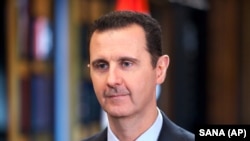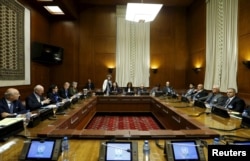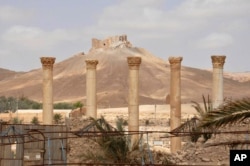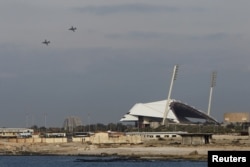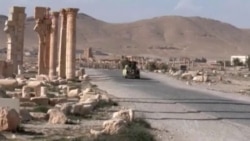Syrian President Bashar al-Assad, whose government has been bolstered by a series of recent military gains, is striking an optimistic tone about the prospects of peace talks aimed at ending his country's five-year-long civil war.
Speaking with Russia's state-owned RIA Novosti news agency Wednesday, the embattled Syrian president said the international talks in Geneva should result in a government that includes both opposition representatives and officials loyal to his regime.
It would be "logical that independent forces, opposition forces, and forces loyal to the state would be represented" in a a new government, Assad said. "This is the aim of Geneva — intra-Syrian dialogue — during which we agree the format of the government," he said.
The interview, which is being published in segments, has not provided details on which opposition groups to which Assad was referring. Assad also did not mention his own future, which has been the subject of intense disagreement.
Difficult issues remain
Assad acknowledged there were several "technical" issues yet to be agreed upon, including the role each faction would play in the new government. "However, these are not difficult issues... they can all be resolved," he insisted.
The U.N. has been conducting Syrian peace talks in Geneva in hopes of ending the Syrian civil war that has left 300,000 or more people dead, created millions of refugees, and obliterated the country's economy.
The talks are now paused. But diplomats hope a transitional government and draft constitution can be agreed upon by August. Assad on Wednesday said a preliminary constitution could be drawn up "within a few weeks."
Over the last several weeks, violence has been sharply reduced during an internationally brokered "cessation of hostilities." Russia, which has backed Assad's government, also recently pulled most of its troops out of Syria.
Recapture of Palmyra
Syrian government forces have taken advantage of the lull in fighting to make important military advances against groups not covered in the cessation.
Damascus' most significant advance was last week's recapture of the ancient and strategic city of Palmyra from Islamic State forces, a victory that came with the help of Russian airstrikes. Syrian officials have said they will now use Palmyra as a base to continue their offensive against Islamic extremists in other areas.
Assad on Wednesday said even when the country stabilizes, Syria will continue to rely on Russian military assistance, not only to "fight against terrorism" but also to ensure geopolitical stability.
"[Russian] military bases are necessary for us, for you, for international balance in the world. That’s the truth, whether we agree with it or not, but right now it’s a necessity," he added.
The war has cost the country more than $200 billion, Assad told RIA. "Economic issues can be settled immediately, when the situation stabilizes in Syria, but rehabilitating the infrastructure will take a long time," he said.
WATCH: Palmyra Restoration Begins in Syria




